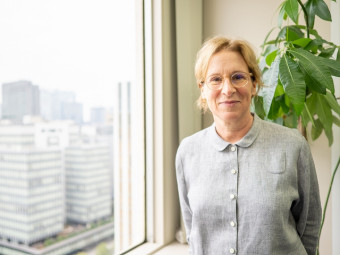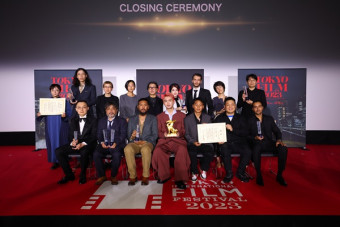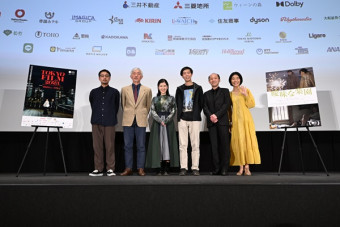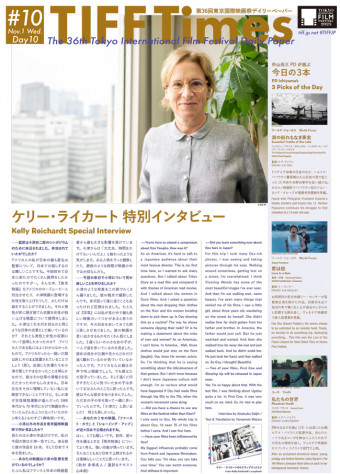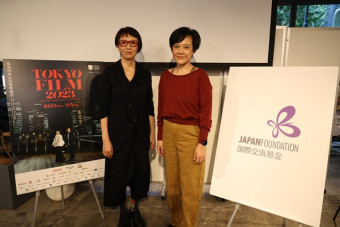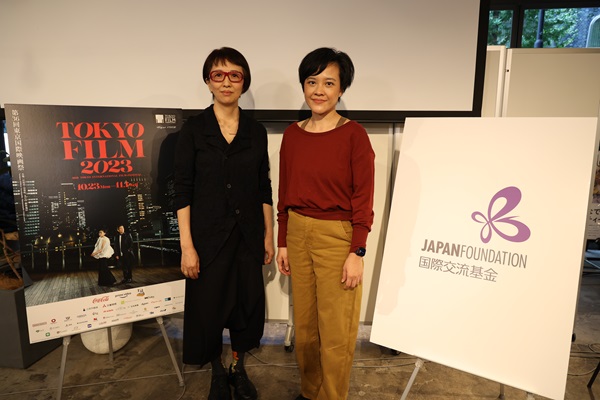
In 2020, when the TIFF Lounge was first launched by the Tokyo International Film Festival and The Japan Foundation as a space for Asian filmmakers to exchange views with one another and the audience, two award-winning female directors were among the initial pairings. In a wide-ranging chat between Yang Yonghi, a Japan-resident Korean documentarian, and Mouly Surya, an Indonesian filmmaker, chatted about the situation of being female filmmakers in Asia, the importance of studying film abroad, and the financing of independent Asian films.
Unfortunately, because of the COVID epidemic, their conversation took place entirely online.
So when Surya was chosen as one of two recipients of this year’s Kurosawa Akira Award (along with Chinese director Gu Xiaogang), TIFF Lounge organizers arranged to stage an encore, but this time in person.
“I always thought we’d maybe run into each other at film festivals,” said Yang, as the two women took their seats at the Yurakucho micro Food & Idea Market on October 31. “But everyone there is always so busy, so I’m grateful to TIFF that we can meet at last.”
For Surya, the feeling was mutual. “It’s such a pleasure to meet for real,” she said. “I think it’s a great opportunity to talk to another Asian woman filmmaker, which is a rare breed.”
Both talked about how they got by as professionals during the pandemic. Yang noted that, as a freelancer, things didn’t really change that much, at least initially. In 2020 and 2021 she made her latest documentary, Soup and Ideology, which, like almost all of her work, including one fiction feature, was about her family—Koreans who have lived their whole lives in Japan. What makes Yang’s story different is that some of her extended family, including brothers, live in North Korea, which makes it difficult to remain in touch. “During the latter part of the pandemic, I was going back and forth to South Korea to edit, and my mother [the main subject of the film] died. I thought a lot about how I could see some people and couldn’t see others, and for the two years I was in South Korea I learned a lot about the society and the film industry.”
The changes that happened in Surya’s life were even more dramatic. She had been planning her fourth feature, a World War II drama called This City Is a Battlefield, but had bed postponed because of the pandemic. “However, because of my earlier film, Marlina the Murderer in Four Acts, I was offered a project in the U.S [called Trigger Warning, an action film produced by Netflix]. So when they greenlighted it in 2021, I moved to the US to direct it.
“So I missed the worst of the pandemic in Jakarta, and by the time I was finished in the US, it was almost over. I was quite shocked by how much the industry had changed while I was away. Everybody had been out of work during COVID, and now they were so busy, I couldn’t get a crew together for This City Is a Battlefield.”
Yang recalled, “I heard from people in Korea that the film industry changed significantly during COVID because the audience got used to watching films and TV series on streaming services. So when the pandemic ended, people didn’t want to go back to the theaters. Everyone in the industry is now working on TV series. In Japan, too. I heard about a big American project that was supposed to be shot in Japan, but they had to give up because they couldn’t get a crew together.”
Clarifying that she didn’t go to the US “because of the problems in Indonesia,” Surya noted that while she was there, she realized how “systematic” the production process is over there. “Indonesia is still a young industry,” she continued. “Until 1998 we were under the Suharto dictatorship and there was censorship, so it was very hard to get a movie into cinemas. Now, of course, it’s bursting, but we don’t have unions like they have in the U.S., so conditions in Indonesia are not assured, though they are improving. Right now we’re just trying to meet the demand.”
But this demand for new talent in Indonesia is also the main reason for the rapid emergence of female directors, about which Yang commented, “There are more women directors now in Japan and Korea, as well, but not for big budget films.” Surya concurred. “Almost all Indonesian films are independent films. There are no studios, and there’s only one big exhibitor. The challenge is promotion, which is very expensive. That’s why so many female directors do horror films, because it’s easy to raise money.”
Both women agreed that there needs to be a “female perspective” in Asian filmmaking, and it’s clear that there is talent in all the countries in the region. The question is how to nurture that talent.
“I’m older, but as a director I’m still a baby,” said Yang. “But I would tell aspiring female directors that the first thing they must do is believe in themselves, otherwise you can’t get others to believe in them. Filmmaking, whether documentaries or fiction features, [requires] collective efforts.”
Surya mentioned that her films are all very different, because she tries never to do the same thing twice. “I made my first feature when I was 27 and didn’t really have a voice. Then I traveled and got to know the world, and that way I think I found my voice. That would be my advice.”
One audience member found this fascinating, and Surya said it was difficult to explain how you can change styles freely but still maintain the same cinematic voice, mentioning Stanley Kubrick as a prime example of this paradox. “It’s about exploring matters exclusively through sound and images.”
“It’s difficult for me to explain, too,” said Yang. “For me it’s all about ‘why not?’ You should live without thinking about gender or any other limitations.”
TIFF Lounge Co-presented by The Japan Foundation & Tokyo International Film Festival
Discussion with Yang Yonghi and Mouly Surya
Guests: Yang Yonghi (Filmmaker), Mouly Su
































